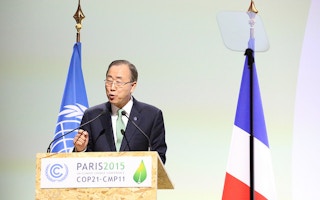Secretary-General Ban Ki-moon gave a favourable report card on Thursday to the early stages of the United Nations climate change conference (COP21) in Paris, while at the same time urging both developed and developing countries to do more to reach universal agreement to mitigate the threat.
“I was very encouraged by what I saw and I heard during the opening days of COP21,” he told a news conference at UN Headquarters in New York. “World leaders did precisely what they were meant to do: give strong impetus to the negotiations. Almost all countries have submitted climate action plans, known as INDCs [Intended Nationally Determined Contributions],” he said.
“Major economies have made significant commitments to cut emissions. Many developed countries have made new financial commitments to help poor and vulnerable countries adapt to climate impacts. Philanthropists and entrepreneurs are making exciting new commitments and investments,” he continued, citing the Breakthrough Energy Coalition announced by Bill Gates.
“
There is no perfect agreement. But our goal is clear: an agreement that truly addresses climate change, and puts the world on track for long-term prosperity, stability and peace.
United Nations Secretary-General Ban Ki-moon
Mr. Ban, who warned some 150 world leaders on the opening day on Monday that they must move much farther and faster to limit the global temperature rise to below 2 degrees Celsius, is returning to the French capital tonight for COP21 Action Day to showcase the huge number of climate partnerships and initiatives involving cities, the private sector, and civil society.
Even the sought-after 2-degree rise will have serious consequences for food and water security, economic stability and international peace as climate change unleashes more devastating floods, disastrous droughts and violent cyclones and storms, and rising seas inundate low-lying island States and shorelines where many major cities are located.
“In the global economy, the transition to a low-emissions future is well under way,” Mr. Ban said, yet, he stressed that in the negotiating room, “there is still a lot of work to do. Key issues remain unresolved, and there is not much time left.”
“I continue to press developed countries to recognise their responsibility to take the lead, while urging developing countries to do more in line with their growing capabilities. The world has gone too long without a universal climate agreement that includes all countries as part of the solution. We cannot delay any longer,” he said.
“There is no perfect agreement. But our goal is clear: an agreement that truly addresses climate change, and puts the world on track for long-term prosperity, stability and peace. That is what the days ahead in Paris can and must deliver,” noted the UN chief.
Turning to the issue of terrorism and the refugee crisis, which has seen hundreds of thousands of Syrians, Iraqis and Afghans flee to Europe, Mr. Ban said the conflict in Syria was a principal cause, citing plans to launch an initiative in early January involving both intra-Syrian political talks and a nationwide ceasefire.
“Closed doors and discrimination are worsening the plight of forcibly displaced people across the world,” he said, adding: “I am especially concerned about misplaced suspicions about migrants and refugees, and widespread anti-Muslim discrimination and bigotry.”
“The world must also be united against terrorism. No grievances or cause can justify the atrocious violence we have seen in recent weeks. The world’s response needs to be robust, and always within the rule of law and with respect for human rights. We cannot be ruled by fear,” the Secretary-General stressed.














